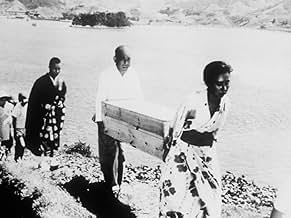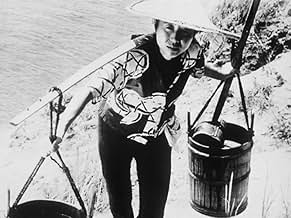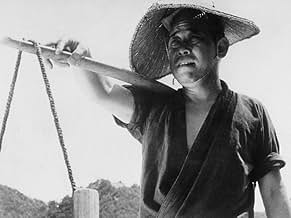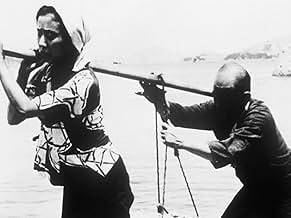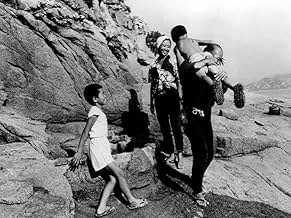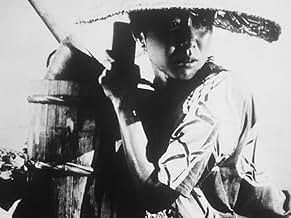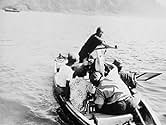IMDb-BEWERTUNG
8,0/10
6526
IHRE BEWERTUNG
Füge eine Handlung in deiner Sprache hinzuA family of four are the sole inhabitants of a small island where they struggle each day to irrigate their crops.A family of four are the sole inhabitants of a small island where they struggle each day to irrigate their crops.A family of four are the sole inhabitants of a small island where they struggle each day to irrigate their crops.
- Nominiert für 1 BAFTA Award
- 5 Gewinne & 1 Nominierung insgesamt
Empfohlene Bewertungen
On a tiny island in the Seto Inland Sea, a small family consisting of husband, wife, and two sons, struggle to get by. They are the island's sole inhabitants, and spend their days fetching water from the mainland and carrying up the steep hill in order to water their crops. One day when the mother and father are away from the island, one of the sons falls ill, and the father races to get help. Their lives are all portrayed in painstaking detail, and the film contains no dialogue whatsoever. The film is directed by Kaneto Shindo, who directed the two brilliant Japanese New Wave horror films, Kuraneko and Onibaba, the only two other films of his I've seen.
This is a break in style and subject for Shindo. The two aforementioned horror films were similarly slow and detailed, but The Naked Island contains no action or atmosphere, but certainly shares their beauty. This is a film that shows how far humanity can be pushed in order to merely get by. The climax of the film (and I don't feel I'm ruining anything by revealing it, the story is not important) has their ill son dying, as his father and the doctor arrive too late. After the funeral, they are forced back to work. The mother, needing to grieve, throws down the water and screams into the ground, as the father watches helpless. Afterwards, she gets up, and methodically resumes watering.
Shindo tackles a universal subject with the neglect of the working class. Filmed with no dialogue, it emphasises their facial expressions and body movements in a way the silent era did, and forces the audience to live through the work they do, every step at a time. The director said he wanted to "capture the life of human beings struggling like ants against the forces of nature," and he certainly does that. The film is slow, and focuses a lot of time on the struggle of carrying the water up the hillside. Yet it's filmed with such elegance, it only hammers their struggle home. This is a beautiful and moving film, that is almost brutal in its relentlessness.
www.the-wrath-of-blog.blogspot.com
This is a break in style and subject for Shindo. The two aforementioned horror films were similarly slow and detailed, but The Naked Island contains no action or atmosphere, but certainly shares their beauty. This is a film that shows how far humanity can be pushed in order to merely get by. The climax of the film (and I don't feel I'm ruining anything by revealing it, the story is not important) has their ill son dying, as his father and the doctor arrive too late. After the funeral, they are forced back to work. The mother, needing to grieve, throws down the water and screams into the ground, as the father watches helpless. Afterwards, she gets up, and methodically resumes watering.
Shindo tackles a universal subject with the neglect of the working class. Filmed with no dialogue, it emphasises their facial expressions and body movements in a way the silent era did, and forces the audience to live through the work they do, every step at a time. The director said he wanted to "capture the life of human beings struggling like ants against the forces of nature," and he certainly does that. The film is slow, and focuses a lot of time on the struggle of carrying the water up the hillside. Yet it's filmed with such elegance, it only hammers their struggle home. This is a beautiful and moving film, that is almost brutal in its relentlessness.
www.the-wrath-of-blog.blogspot.com
10sansay
I saw this movie twenty years ago and I still remember it fondly. It should be part of the training of movie directors to see and analyze this movie. The naked island (as it was named in France) shows the hard struggle of a fisherman's family to survive in a very harsh environment. It is very emotional yet does not call on any modern artifice to carry the message. The music will stay with you forever. My only regret is that I can't get a copy to show my children what movie making can be.
Okay, we have a loving tribute here, personal for director Kaneto Shindo as portraying the life of his parents. We have the rural hardship, and dogged persistence for live in a place where water is painfully hauled over a steep cliff, and we have the quiet cinematic language that describes it.
But also describes a life of simple pleasures. Shindo observes both closely, with sympathy.
The narrative thread of The Naked Island flows with the slow and dull repetition of life itself - if the movie is dull and monotonous it is because life is dull and monotonous and with a handful of fleeting moments of pleasure and joy scattered among the daily routine of making ends meet. In that sense, the artificiality that some reviewers have spoken of (certainly Shindo's decision to include no dialogues and the film almost silent save for a few natural sounds and voices) touches upon the heart of the thing.
The film follows the cycle of the seasons as the family tries to survive in the small island and it is by using the renewal of nature as a backdrop that Shindo draws emphasis on the periodic nature of life and time - the snake that eats its tail. The theme of renewal and the cycle of life and death is further symbolized through long, repetitious sequences of the man and wife transporting irrigation water in large buckets through the steep steps of a hillside and even further as Shindo ends the film cyclically with the same aerial shot that opened it.
The other major triumph for the great Japanese director is the visual language he employs to tell the simple and languidly paced story. This is probably a point that will only interest the avid film buff but I'm fairly sure it's that kind of person only that will seek out such a film anyway. The cinematography consists of full images, superb staging and framing of the (little is the truth) action, images as much beautiful in the subject they present as in the presentation of the subject itself and vibrating with honesty and clarity of vision. As with Kurosawa in DERSU UZALA, The Naked Island captures the essence of 'life as lived in' - the texture, the mood, the smell.
Combined with the symbolism he has carefully planted within the film, The Naked Island is a complete depiction of life on both macrocosmic and microcosmic levels. Of a very specific kind of life the truth is (rural life in a Japanese island in the 30's) but in the larger scheme of things and in the things that actually matter, what is true of one man is true of many.
In an age where directors are content to just wink at their audiences with a sense of smug satisfaction, presenting us with cynic and gimmicky films, swapping emotional catharsis for surprise 'twists', doing away with honest character portrayals in favour of decorating characters with random quirks, having forgotten visual storytelling in favour of redundant voiceovers, shaky cams or self-consciously, witty dialogue; in an age like this, The Naked Island seems to come from another planet, alien to the mentality and ethics of modern cinema as much as its bucolic subject matter is to modern city life. It's definitely not something that will appeal to most but those that will set out looking for it will not be disappointed.
But also describes a life of simple pleasures. Shindo observes both closely, with sympathy.
The narrative thread of The Naked Island flows with the slow and dull repetition of life itself - if the movie is dull and monotonous it is because life is dull and monotonous and with a handful of fleeting moments of pleasure and joy scattered among the daily routine of making ends meet. In that sense, the artificiality that some reviewers have spoken of (certainly Shindo's decision to include no dialogues and the film almost silent save for a few natural sounds and voices) touches upon the heart of the thing.
The film follows the cycle of the seasons as the family tries to survive in the small island and it is by using the renewal of nature as a backdrop that Shindo draws emphasis on the periodic nature of life and time - the snake that eats its tail. The theme of renewal and the cycle of life and death is further symbolized through long, repetitious sequences of the man and wife transporting irrigation water in large buckets through the steep steps of a hillside and even further as Shindo ends the film cyclically with the same aerial shot that opened it.
The other major triumph for the great Japanese director is the visual language he employs to tell the simple and languidly paced story. This is probably a point that will only interest the avid film buff but I'm fairly sure it's that kind of person only that will seek out such a film anyway. The cinematography consists of full images, superb staging and framing of the (little is the truth) action, images as much beautiful in the subject they present as in the presentation of the subject itself and vibrating with honesty and clarity of vision. As with Kurosawa in DERSU UZALA, The Naked Island captures the essence of 'life as lived in' - the texture, the mood, the smell.
Combined with the symbolism he has carefully planted within the film, The Naked Island is a complete depiction of life on both macrocosmic and microcosmic levels. Of a very specific kind of life the truth is (rural life in a Japanese island in the 30's) but in the larger scheme of things and in the things that actually matter, what is true of one man is true of many.
In an age where directors are content to just wink at their audiences with a sense of smug satisfaction, presenting us with cynic and gimmicky films, swapping emotional catharsis for surprise 'twists', doing away with honest character portrayals in favour of decorating characters with random quirks, having forgotten visual storytelling in favour of redundant voiceovers, shaky cams or self-consciously, witty dialogue; in an age like this, The Naked Island seems to come from another planet, alien to the mentality and ethics of modern cinema as much as its bucolic subject matter is to modern city life. It's definitely not something that will appeal to most but those that will set out looking for it will not be disappointed.
I was living next to the Seto Naikai (Inland Sea) at the time this movie was made, and marvel at its matchless, eclectic choice of images and atmosphere to convey the ambiance of the time and place. The photography, music, and restrained acting are perfection itself. The lack of dialogue helps, rather than hinders, its beautiful, simple story. It has captured a Japanese way of life and culture (actually lived by the director---the movie was made as a tribute to his parents) forever and in the very highest artistic sense. The movie is so genuine, so sympathetic to its participants and subject matter, that the viewer is softly, irresistibly, drawn in to share their travails. For years it has been a wonder to me why this classic film has been forgotten. Of the thousands of movies I have seen in my lifetime, this is the finest.
10billr-3
I remember this film from my student days. I saw it in an uptown, shabby, art house theatre (when art meant porn) in Philadelphia. I was amazed. As I recall, it is a film without dialog. Not silent, but no dialog. Black and white, but singularly visual. Three, maybe four characters with self- effacing directing and camera work, it was as intimate as small off-Broadway theatre. I've seen nothing since as cinematic, or moving. No one I've ever met, has seen it. But I remember it vividly.
Wusstest du schon
- Wissenswertes'Hadaka no shima' was made, in the words of its director, "as a 'cinematic poem' to try and capture the life of human beings struggling like ants against the forces of nature."
Top-Auswahl
Melde dich zum Bewerten an und greife auf die Watchlist für personalisierte Empfehlungen zu.
- How long is The Naked Island?Powered by Alexa
Details
Box Office
- Weltweiter Bruttoertrag
- 14.673 $
- Laufzeit1 Stunde 36 Minuten
- Farbe
- Sound-Mix
- Seitenverhältnis
- 2.35 : 1
Zu dieser Seite beitragen
Bearbeitung vorschlagen oder fehlenden Inhalt hinzufügen




